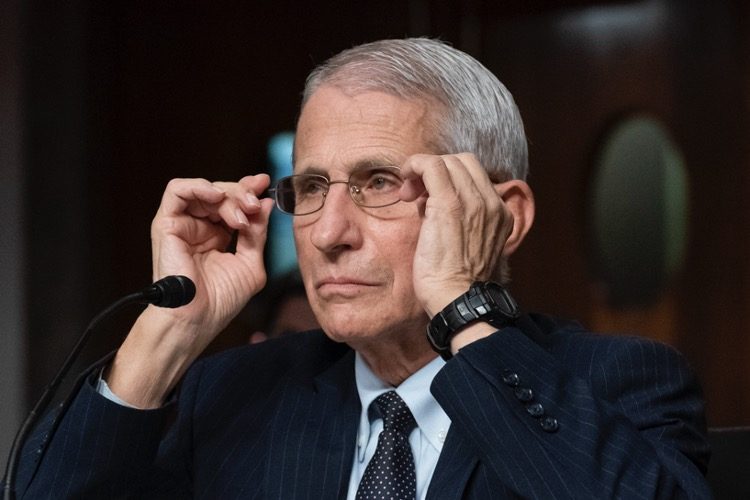
Dr. Anthony Fauci, President Biden’s top medical advisor, warned the “Delta variant” of COVID-19 could become prevalent in the United States if vaccination rates don’t increase.
Fauci said Tuesday at the White House COVID-19 task force briefing the so-called Delta variant, or B1.617.2, could overtake the highly contagious U.K. variant (aka “Alpha variant,” or B117), in the country. He pointed out that across the pond, the Delta is replacing the U.K. variant, particularly in the younger population, and now accounts for 60 percent of new cases in Great Britain.
“We cannot let that happen in the United States, which is such a powerful argument … to get vaccinated. Particularly if you had that first dose, make sure you get that second dose. If not, please get vaccinated,” Fauci said in the briefing.
President Biden echoed the message on Twitter: “Folks, the Delta variant — a highly infectious COVID-19 strain — is spreading rapidly among young people between 12 and 20 years old in the U.K. If you’re young and haven’t gotten your shot yet, it really is time. It’s the best way to protect yourself and those you love.”
The Alpha variant, first identified in the U.K., is currently the most common virus strain in the United States.
The Delta variant is believed to be at least as infectious as the Alpha variant, and has now spread to more than 60 countries. It also has extra mutations that means it may escape the antibody response, so vaccines offer less protection against it when just one dose is given.
According to a newly released Bloomberg News report, doctors in India raised alarm that the Delta variant in the country is linked to a host of troubling new symptoms never seen in patients before — including gangrene from blood clots, hearing impairment, and severe gastric upsets.
Six doctors treating patients across India have all said they have experienced a wide variety of conditions, including stomach pain, nausea, vomiting, loss of appetite, hearing loss, and joint pain in patients with the Delta variant.
According to the Bloomberg report, in England and Scotland, early evidence suggests the now-dominant strain carries a higher risk of hospitalization.
The Center for Disease Control and Prevention (CDC) currently considers Delta a “variant of interest,” meaning a strain of a cluster of new infections with a SARS-CoV-2 variant with mutatations not previously identified. CDC says that such variants have “specific genetic markers that have been associated with changes to receptor binding, reduced neutralization by antibodies generated against previous infection or vaccination, reduced efficacy of treatments, potential diagnostic impact, or predicted increase in transmissibility or disease severity.”
The CDC also notes that viruses constantly change through mutation, and new variants of a virus are expected to occur. Sometimes new variants emerge and disappear. Other times, new variants persist.
Despite the notion that vaccination may not be as effective against the new variants, it is still pushed as a remedy. Indeed, a couple of new studies still show a significant, but notably decreased, effectiveness of the existing vaccines.
A U.K.-based study conducted by Public Health England, and posted on May 24, found that Pfizer’s COVID-19 vaccine was 88-percent effective at preventing symptomatic COVID-19 caused by the Delta variant after two doses, but only 33-percent effective after a single dose. That’s a drop from the reported 92.1-percent effectiveness against the original strain just after the first shot, and 95-percent effectiveness after the second one.
Another lab-based study from the U.K. posted Thursday found that the antibody response, a part of the immune system that fights the virus, was “significantly lower” against the Delta variant compared to the Alpha variant after one dose.
Last month, Luc Montagnier, a French virologist and recipient of the 2008 Nobel Prize in Medicine for his discovery of the human immunodeficiency virus (HIV), explicitly warned that the variants of SARS-CoV-2 that causes COVID-19 emerge as a result of vaccination.
The prominent virologist explained that vaccines don’t stop the virus, instead, they facilitate its development into stronger and more transmittable variants. These new variants are more resistant to vaccination — which is now proved by the recent studies. The new variants, said Montagnier, will likely cause more health implications than their “original” versions, which is now being proved by the Indian doctors who treat COVID patients.
The mutation and strengthening of the virus occur owing to the phenomenon known as Antibody Dependent Enhancement (ADE), which is a mechanism that increases the ability of a virus to enter cells and cause a worsening of the disease. It occurs when the antibodies generated during an immune response recognize and bind to a pathogen, but they are unable to prevent infection. It was observed in SARS-CoV-1, among other viruses.
The same concern is shared by Belgian virologist Vanden Bossche, who is calling for a halt to the mass-vaccination programs. He believes that if the jabs are not halted, they could lead to the evolution of stronger and stronger variants of the virus until a “supervirus” takes hold and wipes out huge numbers of people.
If Fauci was a true professional, he would ask the public to stop taking the COVID-19 vaccines. At the same time, Fauci’s credibility has been undermined so much lately that many people might not follow his advice.




